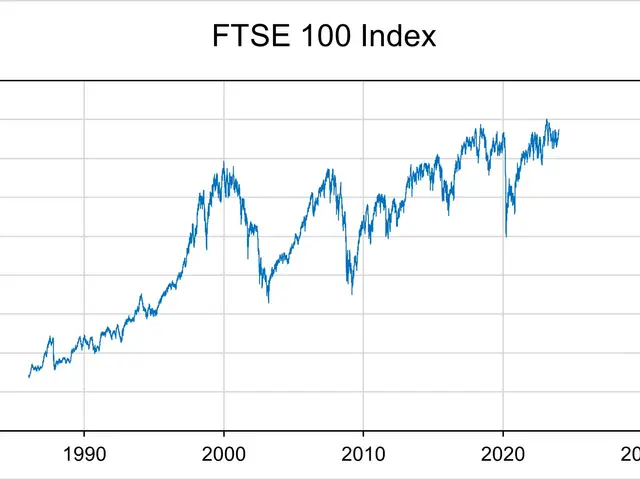Feeling the Burn: NFLX Stock Tumble and What You Need to Know
Netflix's Shares Potential 60% Dive
Question: How would it feel to own Netflix stock and see it plummet by 60% or even 70% in the next few months? It's not just a far-fetched idea, it's a reality we've witnessed in the past. Although Netflix stayed steady this year following a remarkable 90% surge in 2024, we're wary of the storm brewing. Here's why you should be concerned.
The harsh truth is, during a recession, Netflix's stock value could plummet drastically. glance back at 2022, and we see Netflix stock plunged over 70% in just a few quarters. Is it possible for Netflix's current stock price of around $870 to dip below $300 if we experience another 2022-like situation? Well, time will tell.
If you're seeking a safer, less volatile investment option with consistent returns, consider the High-Quality Investment Strategy. This approach has outperformed the S&P 500 since its inception, delivering returns greater than 91%.
The Reason Behind the Unease
Netflix's Subscriber Growth Slowing Down in 2025
Netflix's subscriber growth might decelerate in 2025 as the main growth drivers - such as the anti-password sharing measure and the ad-supported streaming plan - have already been rolled out across the major markets. With these initiatives already in place, Netflix could face challenges sustaining its impressive growth rate, affecting its stock performance.
By the end of 2024, Netflix added over 40 million subscribers, bringing its paid subscriber base close to 302 million. This growth was largely driven by its move to curb password sharing and the successful launch of its ad-supported streaming plan. However, as these growth drivers reach their peak, Netflix may find it difficult to maintain its momentum.
Economic Uncertainty Threatening Netflix

Economic uncertainty could further impact Netflix due to its reliance on consumer spending. Factors like Trump's tariffs on key trading partners and the possibility of a recession raised concerns over inflation and the overall U.S. economy. In an interview, the President did not rule out the possibility that his tariff policies could trigger a recession, leading to a 4% fall in the Nasdaq index.
In this volatile economic climate, the risks for Netflix become even more apparent. Additional challenges include ongoing geopolitical tensions, increased import costs due to tariffs, heightened competition, and subscriber pushback due to rising plan prices. These factors could weigh on both profitability and stock performance in the near term.
Is Netflix Resilient During Downturns?
Although Netflix's losses during some downturns were slightly less severe than the S&P 500 index, it's essential to prepare for the worst. Our dashboard, "How Low Can Netflix Stock Go In A Market Crash?", analyzes Netflix's performance during and after previous market crashes.
Inflation Shock (2022)
- NFLX stock dropped 72.1%, from $597.37 on 3 January 2022 to $166.37 on 11 May 2022.
- The stock fully recovered to its pre-Crisis peak by 27 February 2024.
Covid Pandemic (2020)
- NFLX stock declined by 22.6%, from $386.19 on 19 February 2020 to $298.84 on 16 March 2020.
- The stock fully recovered to its pre-Crisis peak by 13 April 2020.

Global Financial Crisis (2008)
- NFLX stock dropped 55.9% from $5.81 on 17 April 2008 to $2.56 on 27 October 2008.
- The stock fully recovered to its pre-Crisis peak by 17 March 2009.
Netflix's High Valuation
At its current price of nearly $870 per share, Netflix is trading at approximately 35x consensus 2025 earnings, which seems expensive considering the potential slowdown in growth and the economic uncertainties. Investors should be cautious about this high valuation, as markets tend to project short-term successes into the long term.
In light of the challenges faced by Netflix, it's crucial to reconsider your investment strategy and consider more stable, low-risk options to preserve and grow your wealth. If holding onto declining stocks seems daunting, consider the Trefis High-Quality Investment Strategy, which has delivered positive returns even during the 2008-09 period when the S&P 500 lost more than 40%. Adopting this approach might provide a smoother ride compared to the benchmark index.
*Invest with Trefis*
Market Beating Portfolios | Rules-Based Wealth
- The High-Quality Investment Strategy, which has outperformed the S&P 500 since its inception, delivering returns greater than 91%, could be a safer, less volatile investment option compared to Netflix, considering the potential risks and uncertainties.
- With Netflix's subscriber growth expected to slow down in 2025 and economic uncertainty threatening the streaming giant, investors should be concerned about the stock's future performance, especially given its high valuation of nearly $870 per share, trading at approximately 35x consensus 2025 earnings.
- In the past, Netflix's stock experienced significant drops during periods of economic volatility, such as the loss of 72.1% during the inflation shock in 2022. These drops highlight the need for investors to reconsider their strategy and consider more stable, low-risk options, like the Trefis High-Quality Investment Strategy, to preserve and grow their wealth.







